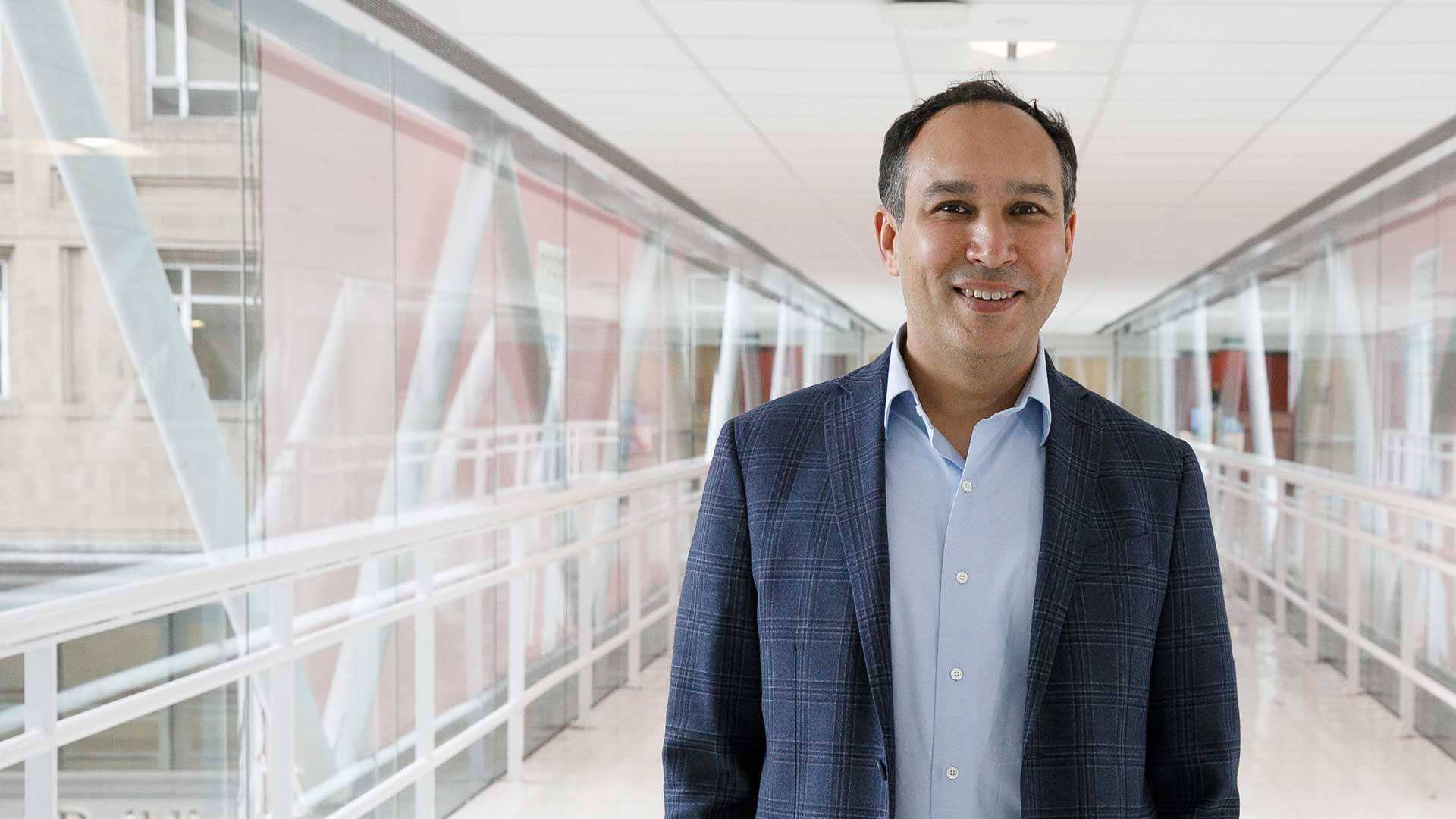

Defining Precision Cancer Medicine
New center aims to go beyond identifying the ‘right drug for the right patient’

Defining Precision Cancer Medicine
New center aims to go beyond identifying the ‘right drug for the right patient’

“Precision cancer medicine needs to be envisioned as understanding how cancer works, which goes beyond individual gene mutations, and using that information to guide prevention, early detection, and therapy.”


Adam Bass, MD
Director, Center for Precision Cancer Medicine,
Herbert Irving Comprehensive Cancer Center


Adam Bass, MD, joined Columbia University Irving Medical Center in January of 2021 from Dana-Farber/Harvard Cancer Center. A leading physician-scientist in genomics and gastrointestinal cancer, Dr. Bass’ research aims to translate findings uncovered in the lab into better and more effective therapeutics for patients with cancer.
Irving Professor of Medicine,
Adam Bass, MD
Vagelos College of Physicians and Surgeons
Director, Center for Precision Cancer Medicine,
Herbert Irving Comprehensive Cancer Center (HICCC) at
NewYork-Presbyterian/Columbia University
Irving Medical Center
Co-leader, Precision Oncology and
Systems Biology research program, HICCC
Director of Gastrointestinal Oncology

“Precision cancer medicine needs to be envisioned as understanding how cancer works, which goes beyond individual gene mutations, and using that information to guide prevention, early detection, and therapy.”
Adam Bass, MD
Director, Center for Precision Cancer Medicine,
Herbert Irving Comprehensive Cancer Center
Adam Bass, MD, joined Columbia University Irving Medical Center in January of 2021 from Dana-Farber/Harvard Cancer Center. A leading physician-scientist in genomics and gastrointestinal cancer, Dr. Bass’ research aims to translate findings uncovered in the lab into better and more effective therapeutics for patients with cancer.
Irving Professor of Medicine,
Adam Bass, MD
Vagelos College of Physicians and Surgeons
Director, Center for Precision Cancer Medicine,
Herbert Irving Comprehensive Cancer Center (HICCC) at NewYork-Presbyterian/Columbia University Irving Medical Center
Co-leader, Precision Oncology and
Systems Biology research program, HICCC
Director of Gastrointestinal Oncology
The concept of precision medicine is founded on the basic principle that there isn’t a “one-size-fits-all” approach to treating patients. Adam Bass, MD, director of the new Center for Precision Cancer Medicine at the Herbert Irving Comprehensive Cancer Center (HICCC) at NewYork-Presbyterian/Columbia University Irving Medical Center, will tell you that precision cancer medicine has become synonymous with identifying the “silver bullet” to treat an individual patient, offering personalized medicine and tailored care.
This means that a doctor can gather the genetic profile of a patient’s tumor, unveil disease-causing mutations, and identify the optimal drug to treat, and at times, eradicate that patient's cancer. Though this model of treatment has transformed care for some, this model requires new perspectives to fulfill its initial promise.
In his directorship, Dr. Bass has set out to define precision cancer medicine, cultivating an all-encompassing scientific hub that pulls from multiple expertise areas and disciplines across the university to tackle precision cancer medicine head-on and in a way that is different to the “silver bullet” concept.
“Today, there is an evolving picture of what precision cancer medicine is and should be,” says Dr. Bass, Irving Professor of Medicine at Columbia’s Vagelos College of Physicians and Surgeons and co-leader of the Precision Oncology and Systems Biology research program at the HICCC. “Precision cancer medicine needs to be envisioned as understanding how cancer works, which goes beyond individual gene mutations, and using that information to guide prevention, early detection, and therapy.”
Genetic sequencing is an important tool and the advances in that technology have been monumental in propelling the field forward. Knowing the specific genes that are mutated, however, is just one piece of an elaborate puzzle that encompasses the remarkable complexity of the fundamental biology of the cancer cell and of non-cancer cells.
The new center, which launched in September, comprises an actively growing program of physician-scientists working at the interface of cancer biology and the development of new cancer diagnostics and therapies. The center coalesces investigators across Columbia and NewYork-Presbyterian in a 360-degree approach, not only bringing discoveries from the lab to patients’ bedsides, but also incorporating research in real time, allowing researchers to understand how cancer evolves and adapts in response to therapies.
To overcome the immense complexity of cancer, multidisciplinary teams are critical and bring unique tools and approaches to the table. Key to this evolving ecosystem is laboratory research, working in the lab with not just cancer biologists but computational biologists, systems biologists, biomedical engineers, and experts in many other fields to uncover how cancers work.
“At Columbia, we have the diversity of expertise to meet that challenge,” says Dr. Bass. “In our center’s inaugural year, we will focus first on recruiting additional physician-scientists and establishing key infrastructure that will support new research projects from many different investigators. Additionally, we will be reaching out across our community to help develop more cross-disciplinary collaborations. It well could be that the most important advances to come in cancer research may originate from a scientist who has yet to realize they are a cancer researcher.”
The concept of precision medicine is founded on the basic principle that there isn’t a “one-size-fits-all” approach to treating patients. Adam Bass, MD, director of the new Center for Precision Cancer Medicine at the Herbert Irving Comprehensive Cancer Center (HICCC) at NewYork-Presbyterian/Columbia University Irving Medical Center, will tell you that precision cancer medicine has become synonymous with identifying the “silver bullet” to treat an individual patient, offering personalized medicine and tailored care.
This means that a doctor can gather the genetic profile of a patient’s tumor, unveil disease-causing mutations, and identify the optimal drug to treat, and at times, eradicate that patient's cancer. Though this model of treatment has transformed care for some, this model requires new perspectives to fulfill its initial promise.
In his directorship, Dr. Bass has set out to define precision cancer medicine, cultivating an all-encompassing scientific hub that pulls from multiple expertise areas and disciplines across the university to tackle precision cancer medicine head-on and in a way that is different to the “silver bullet” concept.
“Today, there is an evolving picture of what precision cancer medicine is and should be,” says Dr. Bass, Irving Professor of Medicine at Columbia’s Vagelos College of Physicians and Surgeons and co-leader of the Precision Oncology and Systems Biology research program at the HICCC. “Precision cancer medicine needs to be envisioned as understanding how cancer works, which goes beyond individual gene mutations, and using that information to guide prevention, early detection, and therapy.”
Genetic sequencing is an important tool and the advances in that technology have been monumental in propelling the field forward. Knowing the specific genes that are mutated, however, is just one piece of an elaborate puzzle that encompasses the remarkable complexity of the fundamental biology of the cancer cell and of non-cancer cells.
The new center, which launched in September, comprises an actively growing program of physician-scientists working at the interface of cancer biology and the development of new cancer diagnostics and therapies. The center coalesces investigators across Columbia and NewYork-Presbyterian in a 360-degree approach, not only bringing discoveries from the lab to patients’ bedsides, but also incorporating research in real time, allowing researchers to understand how cancer evolves and adapts in response to therapies.
To overcome the immense complexity of cancer, multidisciplinary teams are critical and bring unique tools and approaches to the table. Key to this evolving ecosystem is laboratory research, working in the lab with not just cancer biologists but computational biologists, systems biologists, biomedical engineers, and experts in many other fields to uncover how cancers work.
“At Columbia, we have the diversity of expertise to meet that challenge,” says Dr. Bass. “In our center’s inaugural year, we will focus first on recruiting additional physician-scientists and establishing key infrastructure that will support new research projects from many different investigators. Additionally, we will be reaching out across our community to help develop more cross-disciplinary collaborations. It well could be that the most important advances to come in cancer research may originate from a scientist who has yet to realize they are a cancer researcher.”


